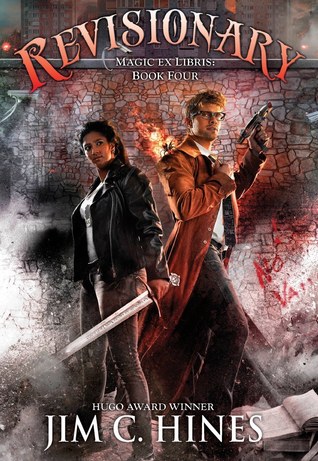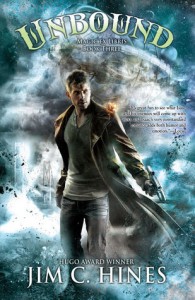 Revisionary (Magic Ex Libris, #4) by Jim C. Hines
Revisionary (Magic Ex Libris, #4) by Jim C. Hines Formats available: hardcover, ebook
Series: Magic Ex Libris #4
Pages: 352
Published by DAW on February 2nd 2016
Purchasing Info: Author's Website, Publisher's Website, Amazon, Barnes & Noble, Kobo, Bookshop.org
Goodreads
The fourth installment in the popular Magic Ex Libris series.
When Isaac Vainio helped to reveal magic to the world, he dreamed of a new millennium of magical prosperity. One year later, things aren’t going quite as he’d hoped. A newly-formed magical organization wants open war with the mundane world. Isaac’s own government is incarcerating “potential supernatural enemies” in prisons and internment camps.
Surrounded by betrayal and political intrigue, Isaac and a ragtag group of allies must evade pursuit both magical and mundane, expose a conspiracy by some of the most powerful people in the world, and find a path to a better future. But the key to victory may lie with Isaac himself, as he struggles to incorporate everything he’s learned into a new, more powerful form of libriomancy.
My Review:
 I dove into Revisionary the second I finished Unbound. I’ve been wondering why I waited so long to read Unbound (reviewed here) and now I know. It was so I wouldn’t have to suffer through a seemingly interminable wait to find out how the story continued. Unbound was marvelous, but the ending fairly clearly indicates that the story as a whole isn’t over.
I dove into Revisionary the second I finished Unbound. I’ve been wondering why I waited so long to read Unbound (reviewed here) and now I know. It was so I wouldn’t have to suffer through a seemingly interminable wait to find out how the story continued. Unbound was marvelous, but the ending fairly clearly indicates that the story as a whole isn’t over.
Now it might be. It’s not that the author couldn’t continue to tell more stories in this world, but that the arc begun in Libriomancer (reviewed here) feels like it comes to a logical conclusion in Revisionary. So if you are thinking of diving into the series (recommended enthusiastically if you love urban fantasy), Libriomancer is definitely the place to start.
The story in Revisionary deals with the impacts of Isaac Vainio’s act at the end of Unbound – he reveals the presence of magic to the world. The world, as one might expect, has reactions varying from thrilled to appalled, with most of the politicians and power-brokers weighing in on the “appalled”, or possibly “fake appalled” side of the equation.
If the fear-mongering and brinksmanship remind readers of present-day politics and the extreme Islamophobia being presented and encouraged by political leaders on one side of the spectrum, I suspect it is intentional.
The reaction of the mundanes to the knowledge that there are magic users among us also has its antecedents in modern fantasy. Sonya Clark’s recent (and awesome) Magic Born series (start with Trancehack, lousy cover but great book) deals squarely with both the result of discovering that some people have magic and the social and economic fallout when the U.S. goes full-oppression and religious fanaticism against a small but growing population.
Katherine Kurtz’ classic epic fantasy of the Deryni, who were also magic-users in a mundane society that found themselves on the receiving end of religious oppression, said it best in her book High Deryni, “Beware, Deryni! Here lies danger!…The humans kill what they do not understand.”
In Revisionary, the humans, the non-magic users, are indeed killing what they do not understand. Even worse, they are pitting groups of magic users and magic beings against each other in vicious experiments to learn the best ways to either suborn or murder each group. Even more insidious, they have orchestrated events to blame all the attacks on the magic users, thereby reaping the political benefits of increased anti-magic laws and regulations.
Magic users and magical beings are being successfully “othered”, in the exact same way that Japanese-Americans were “othered” in WW2 before sending them to detention camps for crimes that not merely they did not commit, but for crimes that were not committed. The magic users are “othered” in the exact same way that too many politicians are currently “othering” members of the Islamic faith, and refugees from war-torn countries, and immigrants. And anyone else they do not approve of, or who is not a member of their race and class.
The political parallels, while difficult to miss, do not detract from the story. In fact, they add depth to it. We’ve seen all of this happen before. It’s happening now. That makes it all too easy to believe that it would happen in this just-barely-different-from-now future.
Revisionary is also the story of an accidental hero, and that is a big part of its charm. Isaac Vainio was content to be a magical researcher and occasional field agent, in that seemingly long ago future where Johann Gutenberg was still ruling the Porters with an iron hand, and knowledge of magic among the mundanes was suppressed by any means necessary, which generally meant a LOT of memory wipes.
In Revisionary, the magical genie is out of the bottle, and Gutenberg is dead. Isaac finds himself at the center of the oncoming storm, as politicians use and abuse magic users for their own nefarious ends, and the remnants of the Society of Porters turn against each other.
Power corrupts, the attempt to grab absolute power corrupts absolutely, and one man who never intended to lead anyone at all finds himself racing to save his life, his friends, and the future.
Escape Rating A+: Revisionary feels like the end of the Magic Ex Libris series. It might not be, but the end of this story does not leave our heroes hanging over a cliff in quite the same way as the previous books. It is possible, based on the ending of Revisionary, to believe that Isaac, Lena, Nidhi and Smudge the fire-spider might be heading into an adventurous and eventful happy ever after. They’ve certainly earned it.
Isaac spends a lot of this book dodging one bullet after another, and tracing the ever darker threads of one nefarious scheme after another. The action is non-stop, the pace is relentless, and the parallels to our contemporary world heighten the tension of the story. While I would love to discover that there is magic in the world, I fear that the world-wide reaction would be much too much like what happens here. The humans all too frequently do kill what they don’t understand, and usually after lying about it first. As happens in Revisionary.
It’s also kind of a delayed coming-of-age story. Isaac has been an adult throughout the series, but in Revisionary he finally becomes the person he was meant to be. Where Gutenberg was the leader of the Porters in the world he effectively created, Isaac is the leader needed now, someone who makes friends and builds alliances instead of creating sycophants and enemies.
The subthread through this story is about the burden of leadership. Isaac is communing with either the ghost of or the book of Gutenberg, and together they ruminate on just how difficult it is to be the person that everyone is looking towards. All the decisions are hard ones, and it never ends. Unless you fail. And in Gutenberg’s case, apparently not even then. The counseling of the old man to the younger one is often wistful, and certainly makes the reader think.
That a story about the magic in books makes its readers think about the consequences of the characters’ actions, and their own, is a fitting end to this terrific series.






















I own this series, but admit that I just haven’t gotten around to starting it yet. This might be the time to jump in, tho, since I won’t have any waiting around for loose ends to be tied up.
I started reading Hines’s blog several years ago–awhile after I’d read his goblin books–and it’s one of the few I check out on a regular basis. I’m not 100% sure I’m remembering correctly, but I think he said at some point that he’s open to coming back to the MEL world depending on how well the series ends up doing, as well as being able to work around his other commitments now that he’s writing full-time.
And yay! for the shout out for Kurtz’s books. I’ve given away most of my paper books, but somewhere deep in storage I still have my original 70s paperbacks of the original trilogy. I so loved those books.
I loved the Deryni series too. I know I read them three or four times. I’m not sure if I still have my original paperbacks, but there was a hardcover reprint and expanded edition a few years back, and I picked up those. That quote still echoes for me.
I read Hines’ blog too. And his cover poses, especially the one for the Flandry series, is something that you just can’t unsee once you’ve seen it. If he starts a new story arc in MEL, that would be marvelous. But I’d like to think of Isaac and company having a bit of time to enjoy a happy ever after. Smudge deserves a break!